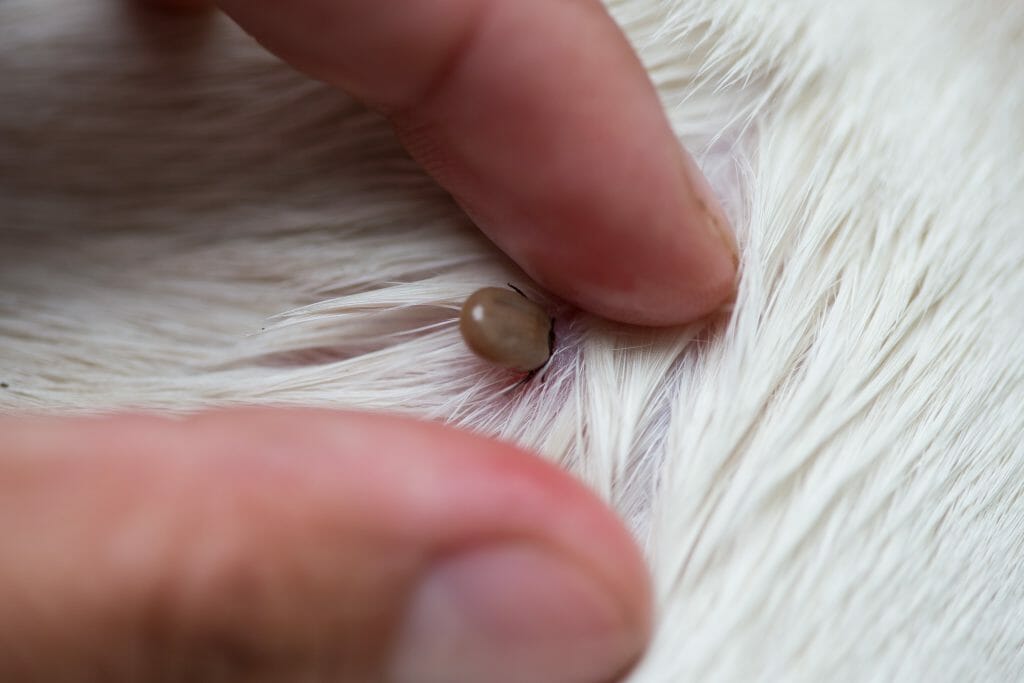Attached ticks cause inflammation and itching, which can lead to irritation and, potentially, secondary bacterial infections.
In addition, blood loss from ticks can become significant during heavy infestations. A few ticks feeding to capacity do not pose a threat to the host’s blood volume. However, in environments with intense tick populations, an animal may acquire hundreds or thousands of ticks, and severe blood loss may result.
Ticks also serve as vectors for and can transmit potentially fatal pathogens.
- These pathogens include Borrelia burgdorferi, the causative agent of Lyme disease, and Anaplasma phagocytophilum, the cause of granulocytic anaplasmosis, Rickettsia species causing Rocky Mountain spotted fever, Babesiosis, Hepatozoonosis, Ehrlichiosis and Cytauxzoonosis.
- Tick-borne diseases often present with similar clinical signs regardless of the infectious organisms involved. These signs may take weeks-months to appear.
- Signs include: lethargy, fever, muscle pain, decreased appetite, discharge from the nostrils or eyes, lameness, increased drinking/urinating and hematologic (blood) abnormalities.
- The majority of tick-borne disease agents cause mild to moderate illness in infected hosts, but several can be fatal in pets and humans.
- Because ticks transmit multiple pathogens and dogs are often infested with numerous ticks, co-infection with multiple tick-borne disease agents is commonly seen and can result in more severe disease.
- Vaccines are available for B burgdorferi in dogs but preventing infection with all of these pathogens depends on strict attention to tick control.
Remember that even though you are not likely to get a tick-borne disease directly from your pets, your pets can bring ticks into your environment that can also attach to you and thereby pose a threat to your health.
If you find ticks on your pet, aren’t sure you got all of the tick out, if your pet is showing any signs of illness, or if you have any questions or concerns regarding ticks and tick-borne illness, please make an appointment with your veterinarian to discuss possible testing and treatment.
How to Prevent Ticks & Tick-Borne Disease
1. Acaricide (a substance that is toxic to ticks) use in pets well before tick exposure can help to repel or kill ticks that the pet is exposed to.
- Options include: monthly topical solutions and collars (possibly less effective)
- To be effective these must be applied to the pets well before exposure.
- You should consult your veterinarian to find the best solution for your pet both in terms of efficacy and safety. Be sure to follow all label directions carefully.
- DO NOT use products labeled only for dogs on your cat!
2. Follow the following protocols for tick habitats. This will decrease the overall number of ticks that have the opportunity to attach and feed.
- If possible avoid areas heavily populated with ticks. Some tick species prefer wooded areas, while others are found in more open surroundings. Tick numbers are often greater along deer trails and other areas frequented by wildlife hosts, and in areas where deer bed down.
- Wear protective clothing. Light-colored long pants and sleeves are protective and allow ticks to be more readily seen. Tucking pant legs into boots will limit tick access to skin, as will taping the waistband and cuffs of sleeves.
- Apply repellents to humans – products containing DEET and permethrin.
3. Remove ticks promptly to prevent disease transmission.
- Even when repellents and protective clothing are used, people should check themselves and their pets for ticks frequently, especially after venturing into prime tick habitat, to insure attached ticks are promptly removed. The longer a tick is attached, the greater the chance for transmission of an infectious disease to you or your pets.
- To remove a tick safely and with the least risk of injury or infection to yourself or the animal, use forceps or a tick tool to grasp the tick mouthparts as close to the skin as possible and apply steady, rearward traction.
- Once removed, save the intact tick for identification, in a vial with ethanol or trapped in a piece of tape that is then placed in the freezer. If the person or animal develops signs of a tick-borne disease in the next few weeks or months, having this tick may assist with prompt diagnosis and appropriate treatment.
- When removing ticks, DO NOT:
– Quickly jerk or twist the tick out of the skin to avoid breaking the mouthparts and leaving a piece of the tick in the skin.
– Apply a lit match or harsh chemical to the tick in an attempt to encourage it to release as this can induce regurgitation in the tick, hastening transmission of pathogens.
– Crush the tick as this may result in exposure of people and pets to infectious material.
4. Protect the home environment.
- Alter environment to make it less conducive to tick survival:
– Removing and burning low-lying vegetation and leaf litter
– Edging the yard with rocks or gravel
– Excluding wildlife, where feasible - In areas with heavy tick infestations, have licensed pest control operators apply environmental sprays.
